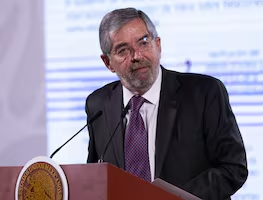Más Información

Posibles deportaciones masivas requieren acciones inmediatas: PRI; reducción de presupuesto del INM agrava situación

Diputada propone despenalizar sustancias psicoactivas; pide aplicar un bdp en impuestos para mejorar salud pública

Analizan reunión de cancilleres para enero; buscan coordinar estrategias antes posibles deportaciones masivas

Sheinbaum: se trabaja para que migrantes puedan acceder a programas del bienestar; colaboran Segob y consulados
For the actress holding the rights to make a movie about Mexican drug lord Joaquín "El Chapo" Guzmán, the latest step toward his eventual extradition to the U.S. is a welcome turn.
"Today's news that El Chapo may be extradited to the United States is good news in that it will allow my team greater access to him in order to tell a full and accurate picture of his unbelievable life and work," Kate del Castillo said through her publicist Monday.
Her comment came after Mexican judicial authorities said a judge ruled that legal requirements had been met for sending Guzmán to the U.S. to face drug charges. The country's Foreign Relations Department must still approve extradition, and Guzmán's lawyers can appeal.
Del Castillo arranged actress Sean Penn's interview with Guzmán in October while the leader of the Sinaloa cartel was on the lam after his second escape from prison. Del Castillo has said she was able to do so because of a relationship that developed around Guzmán's interest in having a film made about his life.
Mexican authorities have said they are investigating whether Del Castillo received any money from Guzmán. She denies that happened.
Del Castillo's optimism that Guzmán would be more accessible in the U.S. after extradition could be misplaced.
"I think that her statement is wishful thinking," said David S. Weinstein, a former prosecutor who oversaw the narcotics division at the U.S. attorney's office in Miami.
"She will have little to no access to him prior to his trial or the resolution of all the cases for which he is extradited to the U.S. to stand trial," Weinstein said.
After a conviction, Del Castillo would have to request an interview through the Bureau of Prisons. With such high-profile inmates, such requests are not routinely granted.
Guzmán's lawyers have confirmed that Del Castillo has the rights to make a movie about the drug lord's life.
On Monday, notary public Gabriel Ezeta said he was the one who issued the document in which Guzmán gave permission to Del Castillo and two others to use his name. The document was issued in January 2015 and signed by Guzmán inside the Altiplano maximum-security prison from which the drug boss escaped through a tunnel the following July.
Ezeta said he charged 7,000 pesos (about US$392) for the service. He did not identify the other two people to whom Guzmán gave permission, but said they were from Argentina and Spain.
He also declined to show a copy of the document because it is private, but said it granted all rights to Guzmán's story.






